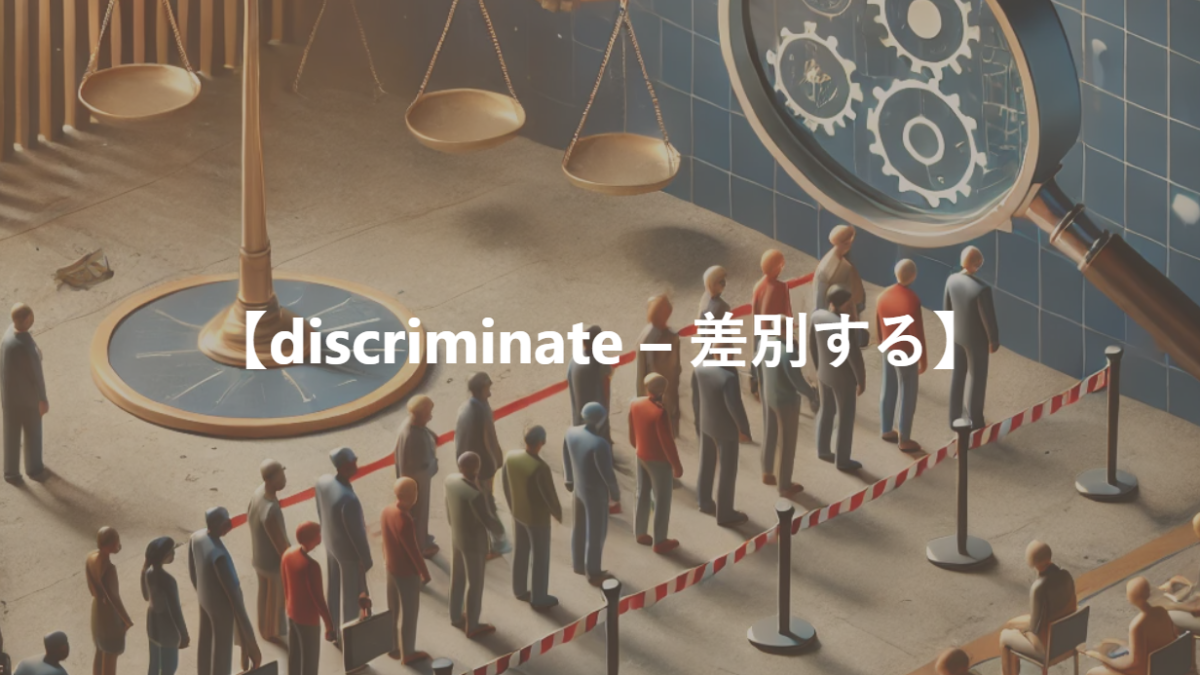Discriminate /dɪˈskrɪmɪneɪt/
区別する、識別する、差別する
物事を区別・識別する能力、または不公平な扱いをすること。文脈により中立的な「区別」から否定的な「差別」まで幅広い意味を持つ。
「discriminate は区別する力、使い方次第で善悪が分かれる」
📚 意味と用法
discriminate は、動詞として主に二つの意味で使われます。一つは、物事を「区別する」「識別する」という中立的な意味です (discriminate between A and B)。もう一つは、人種、性別、年齢などを理由に不公平な扱いをする「差別する」という否定的な意味です (discriminate against someone)。文脈によって意味が大きく変わるため、注意が必要です。
区別・識別する (Distinguish/Differentiate)
Can you discriminate between these two colors?
(この二つの色を区別できますか?)
差別する (Treat unfairly)
It’s illegal to discriminate against employees based on age.
(年齢を理由に従業員を差別することは違法です。)
🕰️ 語源と歴史
「Discriminate」は、ラテン語の「discriminare」に由来します。これは「分離する」「区別する」といった意味を持つ動詞で、さらに「discrimen」(区別、境界)という名詞から派生しています。「discrimen」は「dis-」(離れて)と「crimen」(決定、判断)の組み合わせから成っています。
17世紀に英語に入った当初は、主に「区別する」「識別する」という中立的な意味で使われていました。「差別する」という否定的な意味は、20世紀に社会的な不平等が問題視されるようになってから強調されるようになりました。
🔄 類義語 (似た意味の言葉)
言葉のニュアンス
| discriminate (between) | 細かな違いを識別する。中立的な意味。 |
| discriminate (against) | 不公平な扱いをする。否定的な意味。 |
| distinguish | 一般的な「区別する」。discriminateより中立的。 |
⚡ 対義語 (反対の意味)
対照的な概念
discriminate (区別する・差別する) ことは、confuse (混同する) ことや、すべてを accept (受け入れる) ことと対照的です。
💬 実践的な例文
A wine expert can discriminate between different vintages.
ワインの専門家は異なる年代のワインを区別できる。
The company was sued for discriminating against older workers.
その会社は年配の労働者を差別したとして訴えられた。
She has the ability to discriminate between genuine and fake artwork.
彼女は本物と偽物の芸術品を見分ける能力がある。
Laws prohibit employers from discriminating on the basis of race or gender.
法律は雇用主が人種や性別を理由に差別することを禁じている。
The test is designed to discriminate between different levels of ability.
そのテストは異なる能力レベルを区別するように設計されている。
🧠 練習問題
以下の空欄に入る最も適切な単語を選んでください。
1. A good teacher should be able to ______ between different learning styles.
解説:
優れた教師は異なる学習スタイルを「区別する (discriminate)」能力が必要です。
2. It’s illegal to ______ against people based on their religion.
解説:
宗教を理由に人々を「差別する (discriminate against)」ことは違法です。
3. Which word is closest in meaning to “discriminate” in a positive sense?
解説:
肯定的な意味での「discriminate」は「distinguish(区別する)」と最も近い意味です。
4. The opposite of “discriminate” (in the sense of distinguish) would be:
解説:
「区別する」意味でのdiscriminateの反対は「混同する (confuse)」です。
5. “Discriminatory” means:
解説:
“Discriminatory”は「偏見を示す、差別的な (showing prejudice)」という意味です。

